A Rinnai Heat Pump is the ideal year-round comfort solution for staying warm in the winter or cool in the summer.
Looking for a powerful and efficient way to stay cool during the summer months? Or maybe it’s time to warm up before New Zealand’s chilly winter season hits. Either way, a Rinnai Heat Pump is the ideal year-round comfort solution.
Our innovative range offers stylish and efficient heating and cooling solutions, adding a layer of superior comfort to your home or business. So whether you’re building a new place, you’re a landlord with tenants who require better climate control, or you simply have a room you’d like to cool or heat, here’s everything you need to know about the world of Heat Pumps:
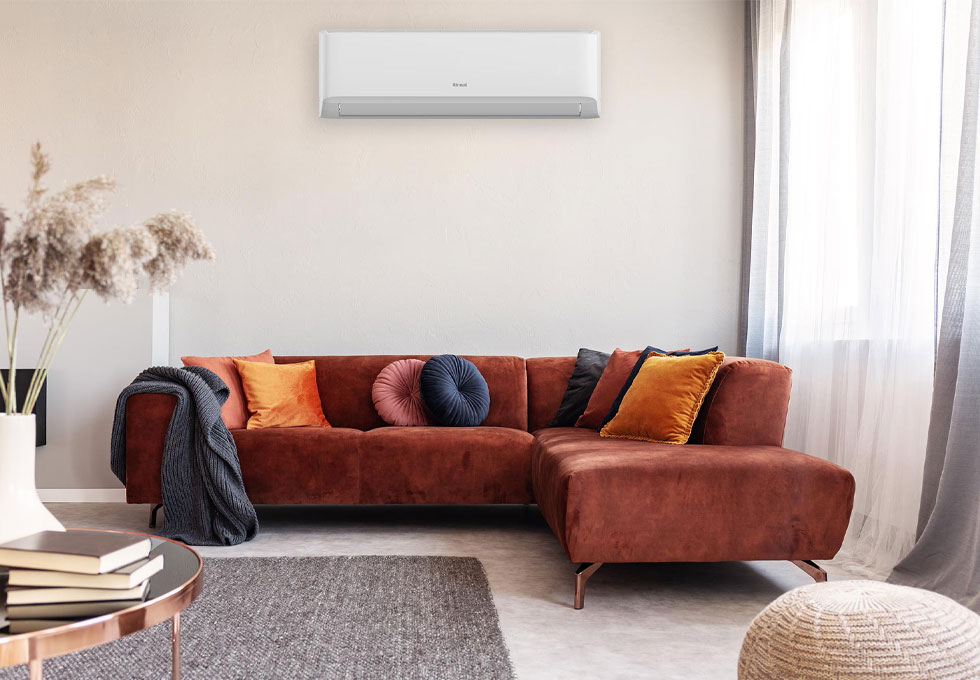
Heat Pumps are wall-mounted or ducted units that work by pumping conditioned air into a specific room or the entire home. Both systems use vents or ducts to circulate heated or cooled air depending on the season
In heating mode, Heat Pumps are like a reverse refrigerator. That’s because they don’t create heat – they simply transfer it from one place to another.
In winter, the system absorbs heat from the cold air outside and transfers it inside your home using refrigerant as the heat transfer medium. It may seem counter-intuitive to use cold air as a heat source, but heat energy is present even at very cold temperatures.
A Heat Pump in heating mode operates just like it does in cooling mode, except that the flow of refrigerant is reversed by the aptly named reversing valve. This flow reversal means that the heating source becomes the outside air (even when outdoor temperatures are low) and the heat energy is released inside the home. The outside coil now has the function of an evaporator, and the indoor coil now has the role of the condenser.
In summer, the process is reversed and the pump will act as an air conditioner, extracting heat energy from the surrounding environment within your home and transferring it outside using the same heat transfer medium.
If you’d like to learn more about our innovative Heat Pump technology, this ‘How Does a Heat Pump Work?’ blog article is well worth a read.
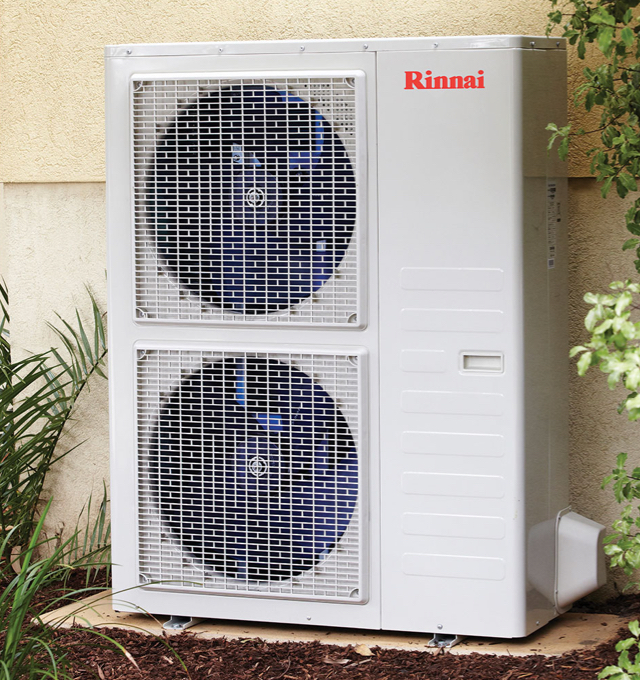
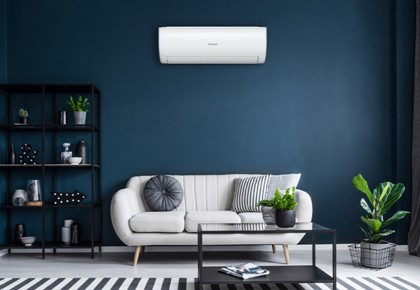
A high wall Heat Pump is the standalone unit you see attached to walls in bedrooms, lounges and other living areas. These units are designed to heat or cool a single room and are incredibly efficient, as they only change the temperature of the room they’re in.
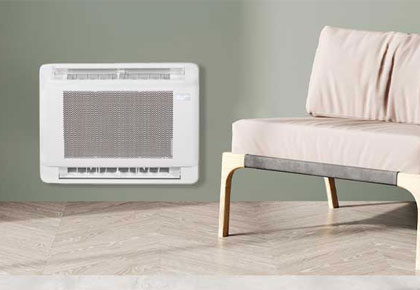
A floor console Heat Pump is a standalone unit that is attached to the lower part of a wall inside a home. Their low placement allows warm air to circulate at the level where it’s most felt, making them particularly effective for Kiwi homes in cooler regions.
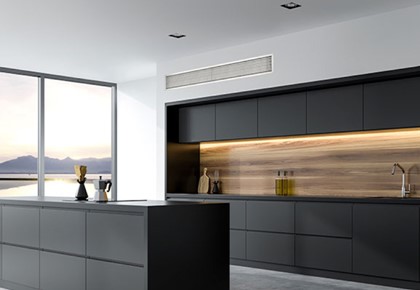
A ducted Heat Pump is a discreet whole-home heating and cooling solution. They flow air through every room in the house, providing you and your family with a consistent temperature throughout and are conveniently concealed in the ceiling.
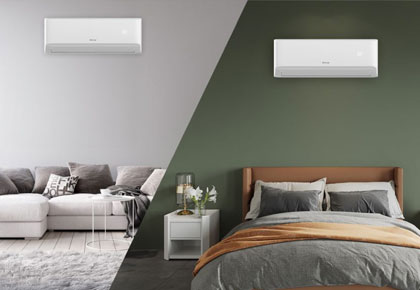
A multi-split Heat Pump system connects one outdoor unit to multiple indoor units to heat different rooms in your home. These systems are great for people who have larger homes or want to have several indoor units, but don’t have the space for multiple units outside.








































Some of the key things you’ll want to think about before you choose a Heat Pump include:
A Heat Pump that’s the wrong size can leave you cold and cost you more in power consumption. Correctly determining the size of equipment for your space is important as it directly relates to how much energy or heat the unit can produce. An undersized unit will be less effective in bringing a room to the desired temperature, while an oversized unit will turn off and on frequently, causing wear and tear.
Because of the technical nature of sizing, the key to picking the right sized Heat Pump for your home is getting an assessment and talking through your options with an accredited professional.
The Rinnai Pro Series High Wall is available in six sizes to suit virtually any room or household, making both ranges an ideal year-round comfort solution for home. Alternatively, our Ducted Central Heating & Cooling systems are designed to create a perfect and even temperature throughout every room in the house.
Use our calculator below to help identify which of our Heat Pumps is right for your space.


You’ve made the decision to have a Heat Pump installed, had installation companies quote for the work and signed on the dotted line… but do you really know what’s instore on the day of install?
The installation of your Heat Pump is a critical step in ensuring it performs to its full potential and is positioned for optimum efficiency. Each system has specific requirements for the amount of airflow it needs so the installer will consider things such as where the windows are located, what kind of ventilation is available, and how your family lives within the space that’s being air conditioned.
Locating the indoor unit in a corner of a room, across a hallway, or in areas where it will be subject to draughts from other rooms will have adverse effects on performance – be aware however, that the best position in a technical sense may not be the best position from an aesthetic or symmetrical point of view.
The best location for the outdoor unit will be based on placing it where it will have the least exposure to the elements and to dust and debris. A nearby tree that sheds pods or leaves, or a dusty and overgrown garden area, may make your Heat Pump more susceptible to getting dirty or blocked, leading to poor functionality.
The time it takes to install a Heat Pump Air Conditioning system can be as short as 3-4 hours for a very simple back to back installation (e.g. indoor and outdoor units located on either side of the same wall and effectively back to back) or up to an entire day for larger, more complicated installations. Ducted systems may take a few days, depending on the number of spaces or ‘zones’ within you home that wanting to air condition.
To prepare you for what to expect when the technicians arrive on installation day, below is an overview of a standard Split System Heat Pump installation.
For a step-by-step guide on what to expect when it comes to Heat Pump installation, check out our blog article ‘What to Expect From a Heat Pump Installation‘.

We’re often asked about the optimal temperature for a Heat Pump. We advise New Zealanders to set their units to somewhere between 18 and 22 degrees in winter. If you want to keep it on all night, you can drop the temperature back to around 18 degrees – or use the ‘Sleep Function’ to take care of it for you. During summer, you can run your Heat Pump on cooling mode at around 18 or 19 degrees. If you want to run it all night you could increase the temperature by a degree or two.
If you’re not at home during the day, there’s no need to keep running your Heat Pump as this could add to your power bills unnecessarily. If your home has good insulation, a couple of hours in the morning and a few hours in the evening should be enough to keep you cool or warm depending on the season.
In terms of maintenance, servicing is often overlooked. We recommend you have your unit professionally serviced every 12 months, ideally before the start of winter, to ensure it’s working optimally. DIY home maintenance can help keep your unit working effectively and efficiently, but shouldn’t replace professional servicing by an accredited Heat Pump Air Conditioning technician.
For more information on how to keep your Heat Pump Air Conditioner working at its best, plus tips on DIY home maintenance, read our ‘Maintaining Your Heat Pump’ blog article.
To find out if your Heat Pump Air Conditioner is showing signs it needs a professional service, our article ‘When Does Your Heat Pump Need Servicing?‘ can help.

The cost of your Heat Pump will vary depending on its size and the complexity of the installation. Rinnai Heat Pumps come with a 6-year warranty when the unit is installed by a Rinnai Accredited Installer (5 years for non-accredited installers).
Use our handy tool to find a dealer who can advise you on the best solution for your space.

Contestants from The Block NZ
“After living without a Heat Pump for about half a year we recently had a Rinnai Heat Pump installed. We live in a partially insulated home but you would never know given our Rinnai’s heating efficiency. We no longer experience crying windows, which used to be commonplace before having the Heat Pump installed. The Heat Pump is extremely efficient, able to heat the whole house (80sqm) fast and keeps the moisture out of the air.
We run our Heat Pump a lot and it is far more cost effective than when we were using electric heaters. The air conditioner mode is a life saver too for our two fluffy dogs on hot summer days. We couldn’t recommend our Rinnai Heat Pump enough.”
– Stacy and Adam Middleton
Contestants on The Block NZ 2019 & 2022
Logan Dodds
“The Rinnai Heat pump has been an absolute life saver in this scorcher muggy summer we have been having. Since installed we have barely turned it off, quiet mode all through the night sleeping.
Looks sleek on the wall, extremely quiet & cools the rooms down in a matter of seconds on turbo mode. My only regret is not getting one installed last summer.”
– Logan Dodds
Auckland
Just complete our simple form to get a free, personalised quote from one of our nationwide Heat Pump dealers.
Looking for a versatile and energy-efficient way to heat and cool multiple rooms in your home? A Rinnai Pro Series Multi Split Heat Pump System
Thinking about installing a hot water heat pump? Here’s the short answer: You’ll need a licensed plumber, a certified electrician, and a suitable installation site.
"*" indicates required fields
Our guide provides a comprehensive overview of Heat Pumps, and how to choose the best system for your home.

By providing your email, you consent to receive communications from Rinnai NZ. You may unsubscribe at any time.